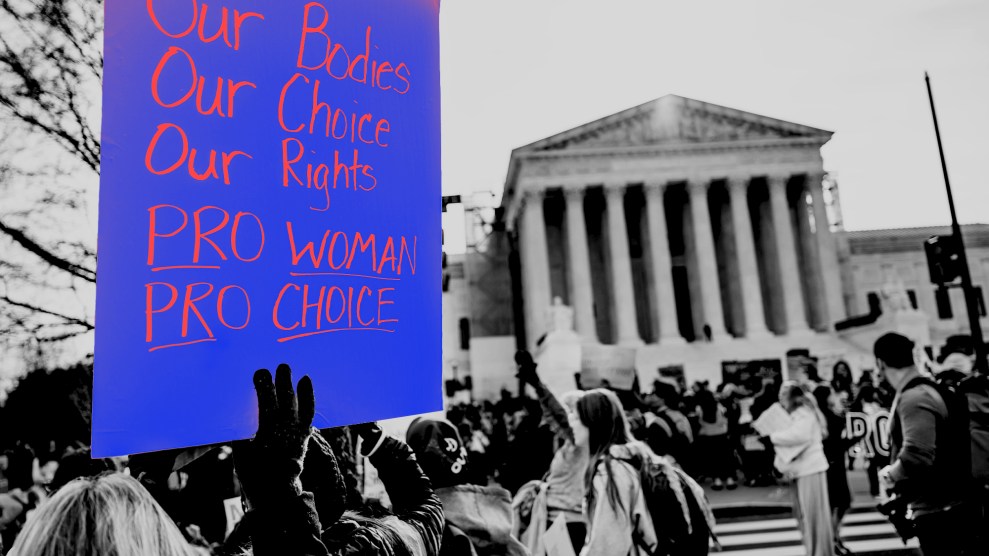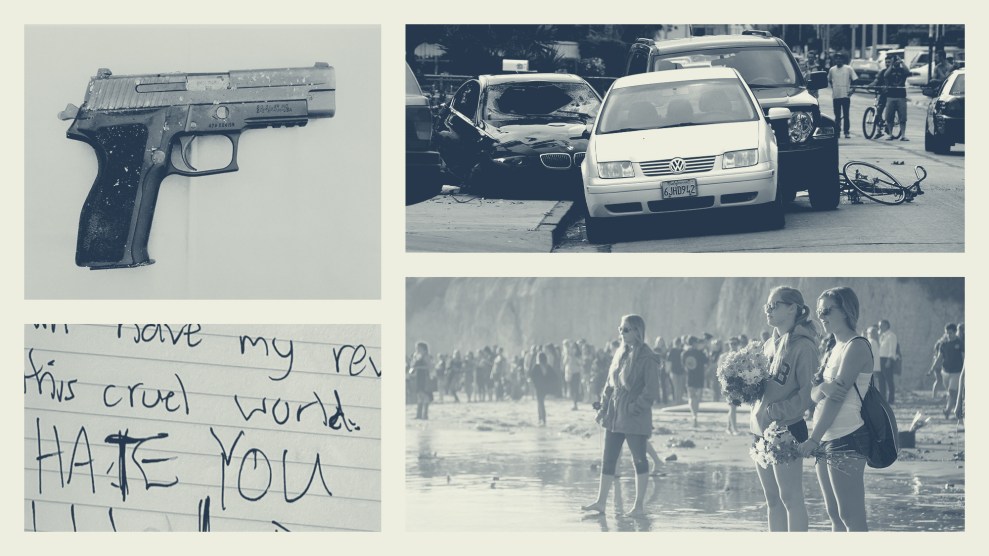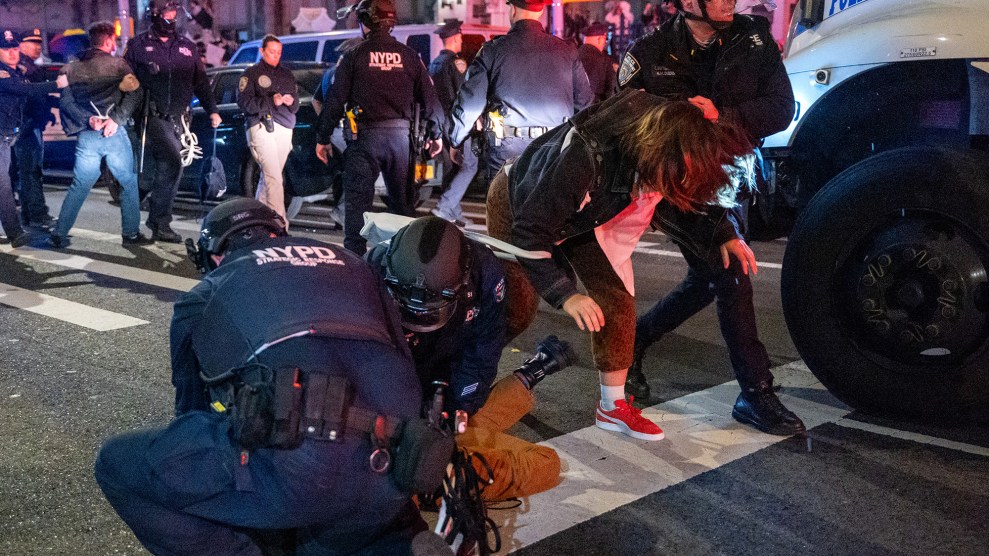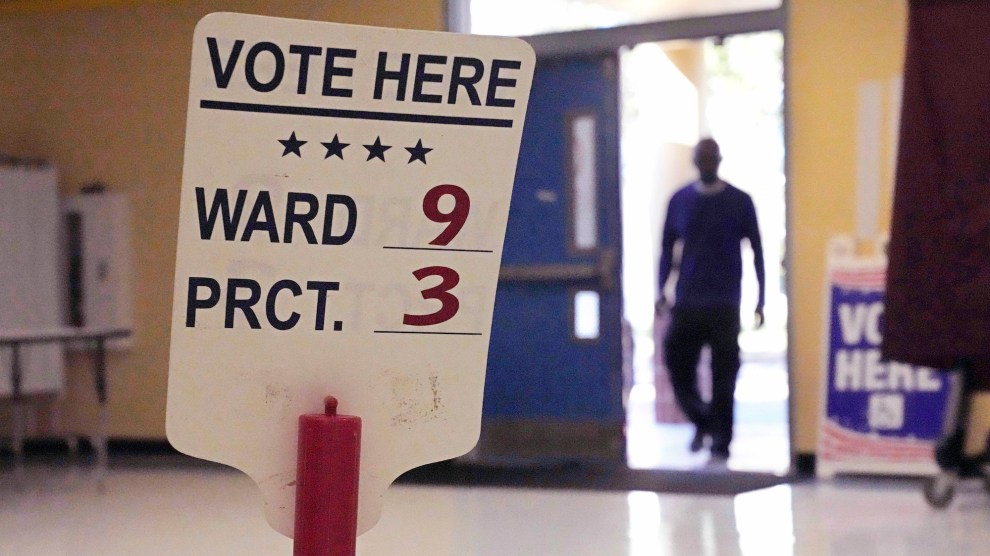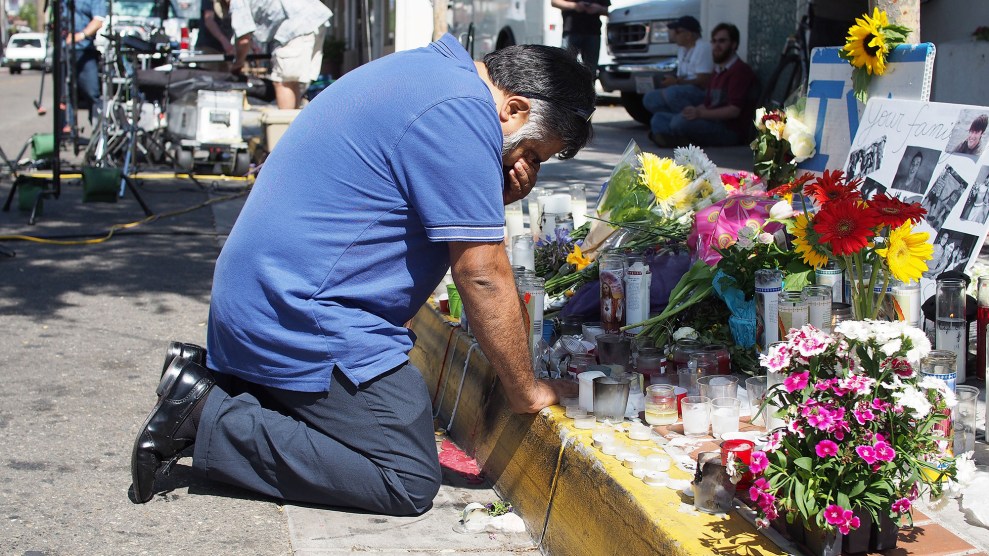During a 1982 murder trial in Philadelphia, a city that’s more than one-third black, the court settled on a jury of 10 whites and two blacks only after prosecutors eliminated 10 qualified black candidates from the jury pool. It took that jury just four hours to hand down a first-degree murder conviction to a young black man accused of killing a white police officer.
Little did anyone know that by sentencing radical black journalist Mumia Abu-Jamal to death they were sparking a movement against the death penalty that would eventually make Abu-Jamal an international cause célèbre. He has written two books and countless articles for newspapers and journals, starred in an HBO special, produced his own compact disc and CD-ROM, and is the focus of a march scheduled for April 24 through downtown Philadelphia called “Millions for Mumia.”
Pat Clark of the American Friends Service Committee (AFSC), a Quaker organization that opposes the death penalty, says the impassioned nature of the case “has taken the debate from an intellectual argument to a gut — a heart — argument. And that’s essential.” It has, says Clark, not only “activated people of color” but “galvanized international attention” around a subject most Western nations stopped discussing when they abolished capital punishment.
But for all the good Abu-Jamal has done in raising awareness about the death penalty, the resolution of this drama will be complicated. While “Free Mumia” posters proliferate, freeing him is not necessarily the goal of everyone who feels that Abu-Jamal received an unfair trial and deserves another. The campaign to free Abu-Jamal also creates a problem for groups trying to defeat the death penalty, some of which find him an imperfect poster boy. Meanwhile, the protest grows as his moment of truth approaches.
Since Abu-Jamal came within 10 days of execution in 1995 (until a judge granted him a stay), the fight to free him has amassed a decent hometown following, but has fared even better outside Philadelphia. A list of his famous patrons reads like a who’s who of the left, and includes Susan Sarandon, Noam Chomsky, Alice Walker, Michael Stipe, Whoopi Goldberg, E.L. Doctorow, David Mamet, Norman Mailer, and the Beastie Boys.
San Francisco mayor Willie Brown has joined the fray, declaring a day in Abu-Jamal’s honor. And several U.S. cities — including Detroit; Cambridge, Massachusetts; and Madison, Wisconsin — have passed resolutions calling for a retrial. Abu-Jamal’s cause is embraced by French president Jacques Chirac, as well as by officials in Germany, Italy, South Africa, and Belgium. There are countless Web sites dedicated to his defense, and rallies and organizational meetings for his cause take place weekly in London, Berlin, and Oslo, Norway. Most of these groups simply want to stop his execution, but some also cite his case as a symbol of the ills of America’s racist justice system.
This global attention focuses on a crime that, according to the official accounts, began as a routine traffic stop in 1981.
Abu-Jamal’s brother, William Cook, was allegedly driving the wrong way down a one-way street when police officer Daniel Faulkner pulled him over. An argument ensued, and then a full-blown fight. According to the prosecution, Abu-Jamal was sitting in a cab across the street when he saw the scene and rushed toward the two men, shooting Faulkner in the back at close range. The officer spun around and returned fire, hitting Abu-Jamal, before collapsing. Then, according to the official account, Abu-Jamal approached the dying Faulkner and shot him again in the forehead, execution-style. Abu-Jamal later collapsed from his wound.
Abu-Jamal’s attorneys contend that an unknown man shot Faulkner and then ran away before more police arrived. The evidence on both sides is muddled and confusing. Some of the prosecution’s eyewitnesses later claimed that the police had coerced their testimony, and one claimed that when she gave her statement to the police she was too high to fully grasp what was happening. In the years since the murder, at least a half-dozen new witnesses have materialized, belatedly offering stories to prove Abu-Jamal’s innocence.
His supporters are united in believing that his trial was fundamentally flawed. And it is here — not in the details of the crime — where they say Abu-Jamal’s case is most symbolic of other capital cases in which defendants are poor and black, and defense attorneys are often short on resources, ability, and experience. In addition to a mostly white jury, Abu-Jamal had a judge known for his strong support for capital punishment, who has presided over more capital cases than any other judge in the United States, and who has sent more defendants to death row than any other judge in Pennsylvania.
Abu-Jamal insisted upon representing himself — a move that the Pennsylvania Supreme Court cited in dismissing his appeal when he later claimed he had received “ineffective assistance of counsel.” His court-appointed backup lawyer, Anthony Jackson, wound up playing a much larger role in the trial than anticipated, filling in on the numerous occasions when the querulous Abu-Jamal was bounced out of the courtroom for disrupting his own case.
Perhaps most important, Abu-Jamal never testified in his own defense, and though his lawyer issued a not guilty plea at the trial, Abu-Jamal did not claim he was innocent until after his conviction. By claiming that an unknown man shot Faulkner, Jackson forfeited the opportunity to prove that Abu-Jamal had acted in self-defense — and he instructed the jury not to consider a lesser charge that would have avoided a death sentence.
A new trial is really Abu-Jamal’s only hope for freedom — and despite long odds, winning a retrial at the federal level is possible. Returning a convicted killer to the streets tomorrow is clearly not.
But opinions on what should happen to Abu-Jamal vary widely among his supporters. The most strident, such as members of MOVE, a radical Afrocentric group, believe he should be set free. Others seem to see his case as more influential than it really is. “Some people think that once you get Mumia off, you’ll get everyone off,” says the AFSC’s Clark.
The two most powerful opponents of the death penalty — Amnesty International and the American Civil Liberties Union — are themselves conflicted. Piers Bannister, Amnesty’s death penalty researcher, won’t scorn an ally in the fight against capital punishment, but he also won’t tie his fortunes to a single case. In its opposition to the death penalty, Bannister says his organization “share[s] the same goal” with the Abu-Jamal supporters. But, he says of those most outspoken in the fight to save Abu-Jamal, “We just don’t want to seem too pally with them.” When pressed, he says that Amnesty is calling neither for Abu-Jamal’s freedom nor for a new trial. “We will need to do an in-depth study of the evidence first,” he says, conceding that “people often criticize us for being too slow to react.”
Diann Rust-Tierney, head of the ACLU’s death penalty project, wrote in an e-mail to Mother Jones: “The ACLU has certainly not shied away from him or the publicity surrounding the case.” But the ACLU has not asked that Abu-Jamal receive a new trial; the two times the organization has taken a stand on his behalf, it took on First Amendment issues. In one case, the ACLU successfully argued that the guards at Abu-Jamal’s prison could not forward to the attorneys at the Pennsylvania Department of Corrections the mail Abu-Jamal wrote to his own lawyers; in the second, the ACLU won a court decision that allowed Pacifica Radio to air a series of Abu-Jamal’s commentaries.
According to the ACLU’s local director in Philadelphia, Larry Frankel, the Free Mumia campaign “has probably made it harder to focus attention on the other people on death row” in the United States. Though Abu-Jamal’s case has brought to light the ways in which the due process rights of death row inmates are routinely violated, Frankel complains that “the high level of publicity surrounding Abu-Jamal’s guilt or innocence makes it hard to talk rationally about the death penalty.”
When word got out that ABC’s “20/20” was going to air a special show about Abu-Jamal, the network was swamped with e-mails and concerned phone calls. The report ended up criticizing Abu-Jamal’s case, but ABC producer Harry Phillips seems genuinely surprised that, as a result, “people…think I’m for the death penalty.” The special, he says, was intended to examine only the question of Abu-Jamal’s guilt — punishment is another matter entirely.
Meanwhile, Abu-Jamal lost his final appeal before the Pennsylvania Supreme Court last October. And though his lawyers are planning an appeal in federal court, Abu-Jamal could be executed at any time.
